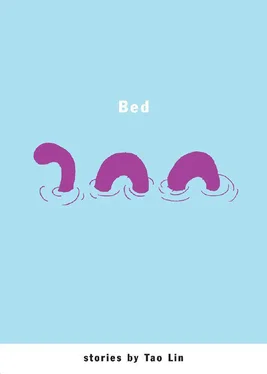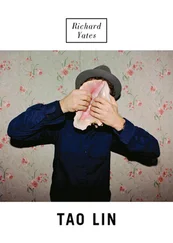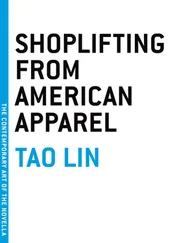Tao Lin - Bed
Здесь есть возможность читать онлайн «Tao Lin - Bed» весь текст электронной книги совершенно бесплатно (целиком полную версию без сокращений). В некоторых случаях можно слушать аудио, скачать через торрент в формате fb2 и присутствует краткое содержание. Год выпуска: 2007, Издательство: Melville House Publishing, Жанр: Современная проза, на английском языке. Описание произведения, (предисловие) а так же отзывы посетителей доступны на портале библиотеки ЛибКат.
- Название:Bed
- Автор:
- Издательство:Melville House Publishing
- Жанр:
- Год:2007
- ISBN:нет данных
- Рейтинг книги:5 / 5. Голосов: 1
-
Избранное:Добавить в избранное
- Отзывы:
-
Ваша оценка:
- 100
- 1
- 2
- 3
- 4
- 5
Bed: краткое содержание, описание и аннотация
Предлагаем к чтению аннотацию, описание, краткое содержание или предисловие (зависит от того, что написал сам автор книги «Bed»). Если вы не нашли необходимую информацию о книге — напишите в комментариях, мы постараемся отыскать её.
Bed — читать онлайн бесплатно полную книгу (весь текст) целиком
Ниже представлен текст книги, разбитый по страницам. Система сохранения места последней прочитанной страницы, позволяет с удобством читать онлайн бесплатно книгу «Bed», без необходимости каждый раз заново искать на чём Вы остановились. Поставьте закладку, и сможете в любой момент перейти на страницу, на которой закончили чтение.
Интервал:
Закладка:
At night, the boy held her and they watched their movie in the Sunshine cinema in Manhattan.
“That was risky,” she said in the boy’s ear. “The third midget.”
“You’re risky,” he said.
“I like midgets.”
“I like you,” he said.
And she felt vivid and nervous, and happy.
Another day, a little bored after a nap, she sort of wandered into a strip mall pet-store and — in a tic of expendable income and misdirected loneliness — bought a 50-gallon fish aquarium, with an oak stand. At home, her dad put the poodle, who he’d named Wong Kar-Wai, in the aquarium, and Wong Kar-Wai lay down, unsurprised and accepting; when Chelsea went to take him out, though, she fell and knocked the aquarium off its stand and Wong Kar-Wai landed badly, and yelped, then walked around strangely, as if paralyzed a little; but after a while walked normally and then one day ran away. Chelsea’s dad put flyers in people’s mailboxes, and an old man called, said he’d found a toy poodle, but that it was his — he lived four houses down, he said, and had almost forgotten about Ronnie, who’d disappeared about half a year ago — and then it was summer and the heat and humidity made Chelsea’s skin oily and, for a few days in July, and then an entire week in August, she thought about moving to San Francisco. She felt excited. But she didn’t know what she would do there. Probably just work at another Denny’s. She wouldn’t have any friends — not that she had any now — and her dad would be alone. And she had to take care of her fish; she had a lot now. So she decided to stay, and settled into a sort of routine: working, napping, reading, taking care of her fish, and, on the weekends, eating dinner or seeing movies with her dad, who she more and more felt comfortable talking to, and who, one evening in October, then, came home from a walk and said he’d met a young man, who’d just moved here for graduate school and with whom he’d set up a date with Chelsea, and Chelsea went on it, but, driving around — she’d said something about these two parks she liked, and then he’d wanted to see them both — was so nervous and became so silent and still, like a statue, almost, though also trembling a bit, and sweating, that, finally, after twenty-five minutes of driving, stupidly, from one park to the other (the parks were in different counties), staring at things, the young man, who had blonde eyebrows and had mentioned when he first got in the car that he felt great, said he felt really sick and needed to go home and sleep. Chelsea dropped him off, and ate pizza alone in her car. And felt so disappointed at herself that when she came home and her dad stood up, smiling, and asked her how it went, she thought she was going to hug him and cry, that it would be one of those scenes — like on TV, when dads say, “Now, now, hey, now,” while holding their daughters, who sob, then sniffle, then eat too many cookies and grin — but nothing like that had ever happened to her and she knew it wouldn’t now, or probably ever. She said she was sleepy and went to her room, and stood there, in the middle of it, wanting to sleep immediately but knowing she should wash her face and brush her teeth first; and being annoyed at that, and then at everything, at all of canceled and envisioning life, the darkened yearning of upkeep and practice, the sarcasm of it all, like a lie that says it’s the truth and begins and goes for a while and then stops being sarcastic and doesn’t go anymore, so that when her dad surprised her, a few minutes later, by coming into her room without knocking, catching her just standing there, not doing anything, with the lights off, she got angry, though mostly it was just dismay — a dry and lifeward sort of beating, unpulsing and everywhere as a sky; how could one cope with that? — and looked at her dad, something wild and extrasensory in her eyes, and shouted that he should knock, that he should go away and knock next time. He left and she showered, then wrote a note of apology and found him in the living room, on the sofa, and handed it to him. But at Sweet Tomatoes the next afternoon — a late lunch before an early movie — he didn’t ask about the young man, whose name was Mitchell, and she didn’t talk about him, and the knowledge of that stayed between them, like a thing that was large and trembled when approached, and they talked less, and the friendliness they’d built between them the past couple of months, like a sandcastle, was subsumed by the water of the last 22 years. In bed that night it felt to Chelsea like whatever this was would go on forever, but also just a little longer, as it was a kind of forever that was so fast and small that it blurred and seemed to be over, already, and always — to be over forever.
And then later that same week at the grocery she saw her manager and turned to go the other direction. She stepped into an instant noodle stand, knocking a few of them down, and began to walk quickly out of the aisle, but then realized that she’d see her manager the next day, at work, and so turned back. He was about twenty feet away and looking at her, and she waved.
“Chelsea,” he said.
“Hi,” Chelsea said. “I’m just here — for buying some things.” He looked a little bored, or else tired, and he gazed at her, a bit meanly, without smiling. She was holding a plum and a toothbrush. She’d been driving around, feeling a little empty, and had wanted a plum, and then had decided to buy a new toothbrush. “Okay,” she said. “I’m going to buy this — fruit.” Her face was red, and she stuttered a little — something that hadn’t happened since high school, she knew immediately.
In the car, she thought about how she’d wanted to go to San Francisco. No one knew because she hadn’t told anyone. She thought about some other things — her dad and mom and Bernadette; college and childhood; how when you were two-years old you didn’t know what a friend was, but mostly just observed things, without any sadness, and didn’t feel alone, even when you were — and then wanted to cry; but it wasn’t happening, so she sort of forced herself to, and it worked. She cried a little, then stopped and ate her plum, slowly, in a daze of chewing and swallowing, and then took her new toothbrush out of its packaging and looked at it and put it in her pocket, and after that cried for a longer time and loudly, shaking a bit.
Before going home, she drove around a while — singing along to songs, not thinking anything at all, and with the windows down, to let the wind at her face — so that her dad wouldn’t see that she had been crying. In the garage, sitting in the car, she laughed a little, thinking of what she’d said to her manager, then felt nervous and afraid, anticipating when she’d see him again, but the next day he was kind and approached her first, smiling and with a small bag of plums, of which Chelsea, on her break and then after work, ate the entire thing of, as she didn’t want to have to explain all this to her dad, or else bring the plums home and have her dad not say anything about them — she didn’t want that either.
In December, for her 23rd birthday, Chelsea went bowling with her dad. It was a strange, woozy night, both of them trying for enthusiasm, but trying halfheartedly, or else too hard, or perhaps not even trying anymore — when did trying try too hard and escape itself and fly away, leaving you there, below and shrinking? — and ended up with a low-level, unwanted sort of sarcasm; the kind where you smirked a lot.
There was an arcade there, and first thing, before bowling — before bowling two games and stopping for ice cream on the way home (Chelsea’s dad insisting on buying a cone and bringing it back to the car, as a sort of surprise, as he felt bad for not getting Chelsea a real present but just a card with money in it; and Chelsea, waiting in the car, looking through the windshield, at her dad in the store looking down through glass, at all the bright and oozy ice creams, to choose something for his daughter, for herself, and feeling, then, in the bones of her face and the dusk of her chest a chill of something casual and temperatureless) — before all that, Chelsea’s dad saw the arcade and went in there and beat a teenager in a fighting game.
Читать дальшеИнтервал:
Закладка:
Похожие книги на «Bed»
Представляем Вашему вниманию похожие книги на «Bed» списком для выбора. Мы отобрали схожую по названию и смыслу литературу в надежде предоставить читателям больше вариантов отыскать новые, интересные, ещё непрочитанные произведения.
Обсуждение, отзывы о книге «Bed» и просто собственные мнения читателей. Оставьте ваши комментарии, напишите, что Вы думаете о произведении, его смысле или главных героях. Укажите что конкретно понравилось, а что нет, и почему Вы так считаете.












